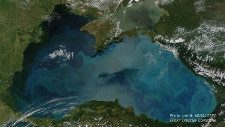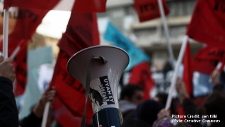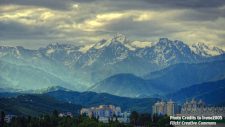Between Fact and Fantasy: Turkey’s Ergenekon Investigation
Gareth H. Jenkins
Since it was first launched in June 2007 following the discovery of a crate of grenades in an Istanbul shantytown, what has become known as the Ergenekon case has become the largest and most controversial judicial investigation in recent Turkish history. Hundreds of suspects have been detained, mostly in multiple simultaneous dawn raids by members of the Counterterrorism Department of the Turkish National Police (TNP). By May 2009, 142 people had been formally charged with membership of the “Ergenekon armed terrorist organization” in two massive indictments totaling 2,455 and 1,909 pages respectively. In mid-June 2009, a third indictment containing charges against yet more alleged members of Ergenekon was expected to be announced later in the year. The trial currently appears likely to continue for several years.
The claims contained in the indictments are as ambitious as the scale of the investigation. According to the public prosecutors handling the case, Ergenekon is a vast organization which has penetrated virtually every aspect of Turkish life and is committed to destabilizing and eventually overthrowing the government of the Islamic conservative Justice and Development Party (AKP). They maintain that, in addition to carrying out terrorist attacks in its own right, Ergenekon is involved in extortion and narcotics trafficking and effectively controls not only the Turkish underworld but virtually every militant group that has committed an act of violence in Turkey over the last 20 years – from the Kurdish separatist Kurdistan Workers’ Party (PKK) through the Marxist Revolutionary People’s Liberation Party – Front (DHKP-C) to numerous violent Islamist groups and organizations.
The case has divided the Turkish population. To some – particularly Kurdish nationalists, supporters of the AKP and some leftists – the Ergenekon investigation represents the “cleansing of the century”; an opportunity for the country finally to eradicate what Turks refer to as the derin devlet, or “deep state”, a shadowy network with its roots in the Turkish military which has long been alleged to have been manipulating the political process and conducting covert operations – including “false flag” terrorist attacks – against perceived enemies of the Turkish state.
To its detractors – who are mostly opponents of the AKP – the Ergenekon investigation is politically motivated; the alleged organization itself a deliberate fabrication by government sympathizers in an attempt to try to discredit and disable secularist opposition to the AKP and clear the way for what they have long suspected are its long-term goals of establishing first a more Islamic society and eventually an Islamic state.
In reality, both characterizations are misleading, albeit to differing degrees. There is evidence to suggest that some – but only some – of the defendants named in the indictments have been engaged in illegal activity and that others – again far from all – hold eccentric or distasteful political opinions and worldviews. There is also evidence to suggest that, particularly in the years immediately after the AKP first came to power in November 2002, some members of the Turkish military high command were frustrated by the failure of the then Chief of the Turkish General Staff (TGS), General Hilmi Özkök, to be more assertive in his dealings with the government. A few are known to have contemplated forcing both Özkök and the AKP from office, although they were prevented from attempting to do either by their failure to enlist the support of their colleagues; the majority of whom argued that the circumstances merited neither the removal of Özkök nor what would effectively have been a coup against an elected government. Similarly, even though it is generally poorly understood and its influence has declined considerably since the late 1990s, the Deep State is a reality of recent Turkish history, and a handful of those who have been indicted are known to be former Deep State operatives.
However, whether among those formally indicted as part of the Ergenekon investigation or those detained in the police raids and subsequently released without charge, many appear to have been guilty of nothing more than opposition to the AKP. In fact, there is no proof that the Ergenekon organization as described in the indictments exists or has ever existed. Indeed, the indictments are so full of contradictions, rumors, speculation, misinformation, illogicalities, absurdities and untruths that they are not even internally consistent or coherent.
This is not to say that the Ergenekon investigation is simply a politically motivated fabrication. There is no reason to doubt that most of those involved in prosecuting the case sincerely believe in the organization’s existence and are unable or unwilling to see the contradictions and irrationalities that are endemic in the indictments. The indictments themselves appear to be the products of “projective” rather than deductive reasoning, working backwards from the premise that the organization exists to weave unrelated individuals, statements and acts into a single massive conspiracy. The more elusive the concrete evidence for Ergenekon’s existence is, the more desperate the attempts to discover it become. Rather than convincing the investigators that what they are looking for does not exist, this elusiveness appears merely to make the organization more fearsome and powerful in their minds; and further fuel their desperation to uncover and eradicate it.
A predilection for conspiracy theories is nothing new in Turkey and can be found across the political spectrum. Both a large proportion of AKP supporters and many of those in law enforcement genuinely believe that a malicious conspiratorial cabal – which most associate with the Deep State – has been not only manipulating the political process but supporting or guiding a large proportion of the political violence in the country. Amongst AKP supporters, attention tends to focus particularly on violence carried out in the name of Islam; where their sincere horror at the carnage that is sometimes perpetrated in the name of their religion has created a culture of denial, and a refusal to believe that their fellow Muslims could be responsible.
However, some of the inconsistencies in the evidence presented to the court have led to accusations that the investigators have amended material to try to reinforce the charges against the defendants. Such accusations have been dismissed as unfounded by those involved in the investigation. But it is difficult to be as dismissive about the frequency with which material – particularly the transcripts of what appear to be recordings of telephone calls involving either the defendants or critics of the investigation – has appeared in pro-AKP media outlets and websites. In most cases, the victims of the apparent wiretaps have claimed that, although substantially accurate, the recordings and transcripts have been doctored to try to incriminate or discredit them. Government officials have dismissed suggestions that the transcripts are based on wiretaps by AKP sympathizers in the TNP, claiming that the equipment required to tap telephone calls is freely available on the black market. While that may be the case, it does not explain why it is only critics and opponents of the AKP who have had their telephones tapped and purported transcripts of their conversations published in the media. Nor does it explain the failure of the law enforcement authorities to investigate the apparent wiretaps. Under Turkish law, tapping a telephone without judicial approval is a crime, as is publishing the transcript of a wiretap.
The law enforcement authorities have also displayed a marked reluctance to pursue other accusations of wrongdoing against those associated with the AKP. Even after a German court ruled in September 2008 that close associates of leading members of the AKP in Turkey had been involved in the embezzlement of at least €16.9 million in donations to the Deniz Feneri e.V. Islamic charity. When members of the Doğan Group, Turkey’s largest media holding, reported details of the German court’s findings, Prime Minister Recep Tayyip Erdoğan instructed party supporters not to buy the group’s newspapers. On February 19, 2009, the tax authorities abruptly fined the Doğan Group TL 826 million (approximately $525 million) for alleged tax irregularities; charges which the group has resolutely denied. On April 13, 2009, one of the Doğan Group’s executives was detained overnight on suspicion of links to Ergenekon. On April 21, 2009, all of the companies in the Doğan Group were banned from bidding for state tenders for a period of one year.
This context has inevitably reinforced suspicions that the Ergenekon investigation cannot be explained solely by the investigators’ penchant for conspiracy theories. Significantly, despite its proponents’ claims that it represents a final reckoning with the some of the darker pages in recent Turkish history, the Ergenekon investigation has made little attempt to investigate the numerous well-documented accusations of abuses by Deep State operatives during its heyday in the 1990s. Indeed, the fear is that it represents a major step not – as its proponents maintain – towards the consolidation of pluralistic democracy in Turkey, but towards an authoritarian one-party state
Related Publications
-
ISDP Annual Report 2023
ISDP’s Annual Report for the year 2023. We look back on 2023, a year in which tensions and conflicts captured the strategic space in ISDP’s focus areas, making headlines around […]
-
A New Spring for Caspian Transit and Trade
Major recent shifts, starting with the Taliban victory in Afghanistan and Russia’s war in Ukraine have led to a resurgence of the Trans-Caspian transportation corridor. This corridor, envisioned in the […]
-
Turkey’s Opposition Can’t Win Without the Working Class
Kemal Kilicdaroglu, the leader of Turkey’s main opposition Republican People’s Party (CHP), has a realistic chance of defeating President Recep Tayyip Erdogan in the upcoming presidential election on May 14. […]
-
Promise And Peril In The Caucasus
America’s national security bureaucracy separates the Caucasus and the Middle East into different bureaus, with Central Asia in yet another office. This is part of the reason the U.S. has […]



